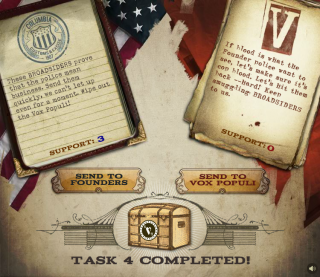I'm going to bring back the T&R name. But not necessarily in a review format, just kind of a general title for anything I decide to express my opinion on. The previous iteration of Thoughts & Ramblings can be found at my YouTube channel.
I don't claim to know the ins and outs of the game industry; I'm not an industry insider. I'm very much an outsider. I read a lot of news and opinion articles and I listen to a lot of discussion on the topic of video games and the industry as a whole, so occasionally I glean some understanding. But most importantly, I play a lot of video games. Not every game, but a lot of games. I felt I should get that out of the way now
Initially, I was extremely excited by the prospect of moral choice in games, as I'm sure most people were. A deeper story and having a real character whose actions and decisions were placed entirely in my control? Gimme gimme! The potential was huge for video games to evolve further and ultimately surpass the capabilities of other story-telling media. But now, I'm not so sure that I actually want moral choices in my video games.
As of yet, I haven't played a game with great implementation of a morality system. Most recently, I played Infamous. Hopefully, I'll get the sequel soon, but in my reading and understanding Infamous 2 is only incrementally different, so, I'm sure it applies. Other games with morality systems in recent years would include Spider-Man: Web of Shadows, Bioshock, Mass Effect and Mass Effect 2, Dragon Age: Origins, and damn near every other game anymore has some touted morality or player choice to varying degrees of implementation.
The problem I run into is I have not found what I would call a true morality system. Moral choices in video games tend to be hyperbolic extremes. And the ones that are not, you kind o' need to choose good or evil from the beginning and stick with that. There's no room for grey. In some games that's quite all right, really. In Infamous, for example, this is perfectly okay, because it's a very comic book inspired world which is largely black and white in that way. But in a game world that is striving toward realism this is largely unfortunate and completely detracts from the realism, in fact.
And then sometimes it locks you out of whole parts of the game. In Mass Effect, depending on your Paragon/Renegade score, you can find yourself locked out of several dialogue options. In Dragon Age, if you want to keep a character you like happy, or a character that you just find most useful, you could be locked out of entire side quests to keep that person pleased. If you instead, just go with what you, or your character if you're properly roleplaying, would do in any given situation you could very well end up with no one being particularly happy with you. Mayhap you could at least manage a balance if you do the quests in an appropriate order. Because if you do a string of quests a character doesn't like, you'll lose that character, but if you alternate between "good" and "bad" quests you can keep things even. And once the story gets to that level of meta, it has lost its impact as a story and becomes just another way of gaming the systems.
I should note that I completely understand the developer point of view for second playthroughs. It extends the length of the game, sure. But I, personally, don't like it in most cases. It feels somewhat like artificial lengthening and in 40+ hour games especially it seems just insane. I would much rather the focus be on a very solid single playthrough with a single ending. As opposed to playing the game twice or more to get multiple endings based on a half dozen choices or variations spread throughout the game.
In the course of writing this I came to the realization that morality systems may work in some games. Obviously, some games still handle things improperly, but present me a game system, no matter how great, and I can probably find at least a handful of games that implement it poorly. But, it works out well as long as you don't have a desire to see all of the content created for the game and can live with one playthrough and only seeing one ending. I would still say it falls apart in every game if you're a person who tries to maximize their game by attempting to get everything in one go. I would prefer developers focus on a great, singular story instead of crafting a largely ambiguous story so that it'll still flow and make sense with either choice in the few places where the story actually differs. It tarnishes the story and ruins the impact of the entire concept of a moral choice.
Of course, a game can still be great even if I don't like a particular system, but it definitely makes the game pale in comparison to others. I think I'm just tired of moral choices in games. Maybe when I finally play Heavy Rain I'll find my shining example of a truly great morality system? Are there any other examples of an excellent application of a true morality system and divergent story paths?

Log in to comment